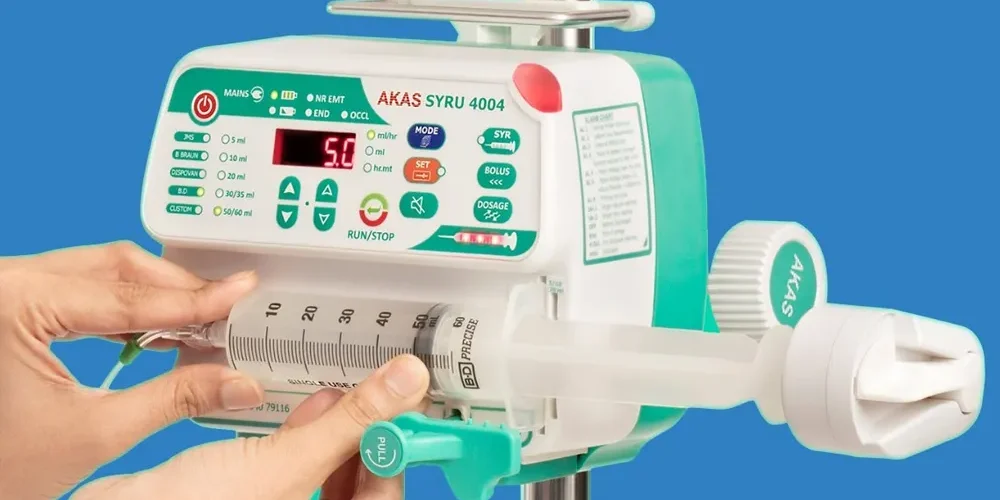Syringe Pumps in Palliative Care: Ensuring Comfort

Introduction:
-
Palliative care focuses on relieving pain, managing symptoms, and improving quality of life.
-
Patients in these settings often face chronic, progressive conditions requiring delicate treatment.
-
Precision, safety, and comfort are essential — and that’s where syringe pumps make a difference.
-
A syringe pump delivers medications at a carefully controlled rate.
-
This allows for continuous, gentle infusions over hours or even days.
-
The result is sustained relief with minimal distress to the patient.
Why Syringe Pumps Are Ideal for Palliative Care
-
Patients in palliative care often require consistent dosing of pain relief or antiemetics.
-
Manual administration can lead to peaks and troughs in drug levels, causing discomfort.
-
A syringe pump offers smooth, controlled delivery, reducing fluctuations in symptom control.
-
Syringe pumps are portable, quiet, and discreet.
-
These qualities allow patients to rest or move freely without disruption.
-
They support care in hospital, hospice, or at home with equal reliability.
Supporting Comfort Through Accurate Medication Delivery
-
Medication errors can severely affect fragile patients in palliative care.
-
Syringe pumps are designed with safety features like occlusion alarms and precise flow rate settings.
-
These technologies help reduce the risk of overdose or underdose.
-
Doses can be adjusted to meet the unique needs of each individual.
-
This level of personalisation ensures that care is as gentle as it is effective.
-
Health professionals can rely on the device to deliver continuous symptom control, day or night.
Enhancing Dignity with Reliable Infusion Systems
-
Maintaining a patient’s dignity is a cornerstone of palliative medicine.
-
Uncontrolled symptoms can cause unnecessary suffering and stress for both patients and families.
-
A syringe pump supports a peaceful environment by minimising intervention.
-
The discreet nature of the device avoids the noise and disruption of frequent manual injections.
-
Family members can focus on quality time rather than managing medication schedules.
-
Healthcare staff are freed to provide emotional support, not just clinical care.
Versatility of Syringe Pumps Across Palliative Settings
-
Conditions like cancer, heart failure, neurological diseases, and advanced dementia benefit from syringe pump use.
-
Drugs such as morphine, midazolam, and haloperidol are commonly administered via infusion.
-
This method ensures rapid onset and steady action, especially in patients unable to take oral medications.
-
Syringe pumps are suited for subcutaneous and intravenous delivery.
-
Their adaptable programming supports complex regimens across all stages of care.
-
This flexibility ensures the pump can meet diverse medical needs with minimal disruption.
Integrating Syringe Pumps Into Home-Based Palliative Care
-
Many families choose to bring their loved ones home during final stages.
-
A syringe pump enables safe, professional-level care in a familiar setting.
-
Community nurses can easily set up and monitor the device with minimal training.
-
Patients gain autonomy while remaining under medical guidance.
-
The pump provides peace of mind that essential medications are being delivered precisely.
-
It’s a compassionate solution that supports emotional, spiritual, and clinical needs.
Choosing Reliable Syringe Pumps for Hospital and Hospice Use
-
Not all syringe pumps are created equal; reliability and ease of use are critical.
-
Features such as clear displays, battery backup, and alarm systems enhance safety.
-
Smooth operation and error-proof programming reduce stress for healthcare professionals.
-
Maintenance, servicing, and manufacturer support should be considered.
-
A trusted syringe pump supplier ensures minimal downtime and reliable operation.
-
Quality infusion devices become silent partners in care — always working, never intruding.
The Role of Staff Training in Syringe Pump Safety
-
Even the most advanced device must be used correctly to deliver full benefit.
-
Training programmes should include setup, programming, troubleshooting, and patient monitoring.
-
Confidence in using the syringe pump translates into better care outcomes.
-
Regular refresher training ensures staff remain skilled and alert to safety protocols.
-
Hospitals and hospices that invest in education empower their teams.
-
Ultimately, it’s the patient who benefits from well-informed, attentive care.
Looking Ahead: Technology and the Future of Palliative Infusions
-
As medical technologies evolve, syringe pumps continue to improve.
-
Innovations such as wireless monitoring and integrated data logging are becoming standard.
-
These upgrades help clinicians track dosage histories and patient responses in real time.
-
Smart infusion systems can alert teams to early signs of complications or equipment issues.
-
Such features increase safety and reduce emergency interventions.
-
The future of syringe pumps is one of even greater precision, empathy, and integration.
Conclusion:
-
Syringe pumps are quiet enablers of comfort and dignity in palliative care.
-
Their ability to provide consistent, gentle dosing makes them invaluable in every stage of life-limiting illness.
-
A trusted, high-performance syringe pump supports patients, families, and caregivers alike.
-
Choosing the right manufacturer is crucial in ensuring safety and reliability.
-
Akas Infusion manufactures world-class drug delivery devices, including dependable volumetric pumps and syringe pumps.
-
Their commitment to quality empowers hospitals and care teams to deliver the kind of care every patient deserves — calm, precise, and deeply human.
- Art
- Causes
- Crafts
- Dance
- Drinks
- Film
- Fitness
- Food
- Spiele
- Gardening
- Health
- Home
- Literature
- Music
- Networking
- Other
- Party
- Religion
- Shopping
- Sports
- Theater
- Wellness


